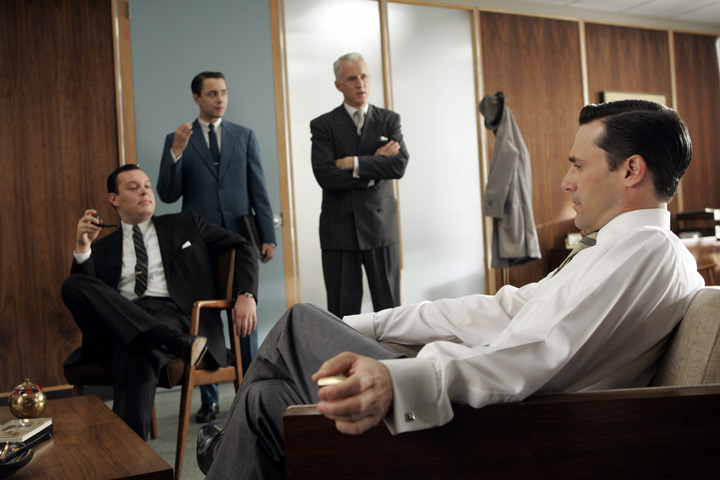I’m always disconcerted when I read Nielsen breakdowns of the viewing habits of white and black Americans, and see how little crossover there is, though, of course, I understand the reasons. It reminds that something can seem incredibly brilliant to a certain group of people but not to another because the social context and experience we bring to a work of art is often as important as the art itself. From “The Very White Poetry of Mad Men” at Capital from my excellent old pal Steven Boone:
“It would be interesting to see what Quentin Tarantino, a product of multi-ethnic working class neighborhoods in L.A., would do behind the camera on a Mad Men episode. His punk history lessonInglourious Basterds revels in ‘mistakes’ (starting with the title) and the perseverance of life’s D-students in a world of letter-perfect sociopaths-in-power. What mischief, what banana peels would Q.T. set in Don Draper’s path?
What approach would we see from filmmaker Robert Downey, Sr., who actually worked in the real-life New York ad agency milieu in the 1960s, funneling these experiences into the anarchic Putney Swope (1969)? In Swope, militant blacks take over a swank agency, a one-joke premise crawling with cobwebs by now, sure, but one which still packs a punch in the stubbornly segregated Bloomberg-era Manhattan.
Mad Men, which so far has given a few lines to a black maid, a black girlfriend and, in the latest season, a black secretary, actually does resonate in that way: In any of the ‘good jobs’ I held in Manhattan across 20 years, I was either the sole black person or one of two black people in the office. A smattering of Asians or Hispanics completed the rainbow.
But that may also be the reason I had such a hard time finding black professionals to talk to who watch Mad Men.
One black computer programmer who requested anonymity was candid about why he doesn’t: ‘Mad Men isn’t for me…. I don’t know any black people who watch the show. I know they’re out there, but I’ve never met any of them.’
The programmer was quick to add that it’s not because of the low melanin content, but because it’s too familiar.
‘It’s not necessary for me to need a black or minority character to enjoy a movie or show, but Mad Men is just so appropriately shiny and false,’ he said. ‘It reminded me a lot of dealing with the sales people I’ve dealt with over the years as a software developer. I’ve worked in offices for 25 years now, and I’ve been the only Negro in my different office departments more years than I’ll admit. It’s that way right now, in fact.
‘Programmers don’t come in our shade unless they’re from India. Until the 2000’s, I didn’t see many minorities of any stripe in high positions at places I worked. So for me, I’ve spent my entire career watching white office folks bicker, fight, backstab, love, hate, succeed and fail, all the while doing little to involve somebody like me. So why the fuck would I want to watch this on TV?'”
••••••••••
Faux ad from Putney Swope, 1969: “It started last weekend / At the Yale-Howard game.”
Read also:
Tags: Steven Boone

